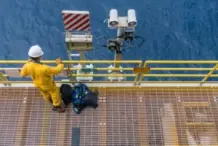
Off-shore accidents are a tragic reality for those that work off-shore. The oil rigs, boats, and ships go out to sea every day. Unfortunately, if accidents happen while they’re out at sea, you might sustain injuries and other damages.
In such a case, consider speaking to a maritime injury lawyer immediately. An off-shore injury attorney can guide you on the next course of action and help you file a claim for compensation.
Why Hire a Laplace Off-Shore Accident Lawyer?
In the wake of an accident or a disaster, you may find yourself or someone close to you injured. In the chaos that follows, you may be unable to determine who is to blame and how much compensation you might be able to receive.
If you were involved in an off-shore work injury in Laplace, it’s natural to be concerned about getting the correct type of legal representation. This is especially true if you’ve sustained severe injuries that are likely to affect your future ability to work.
The owners of vessels that carry passengers for hire or that provide services on navigable waters should ensure that their vessel is a safe place to be and that all safety protocols are followed. Off-shore accidents are common when workers are forced to do their job in an unsafe environment. In case of an accident, an off-shore accident attorney could help by:
- Investigating the causes of the accident and identifying the liable parties
- Assisting you in filing the claim
- Negotiating with insurance companies on your behalf
Laborde Earles injury was great for me they took care of me very fast and professional. If for any reason I need legal help they will be who I use.
ClientCauses of Off-shore Accidents
An off-shore accident could happen in many ways, and when it happens, it can be a life-changing event for the victim. The most common causes of off-shore accidents can include:
- Slips and Trips: The cause is usually some obstruction or spillage on the floor, but it could also be a failure to use proper ladders or fall arrest equipment.
- Falling Overboard: A fall into the sea is always dangerous, and can sometimes be fatal.
- Falling From High Places: This could be from the top of a platform, ladder, or scaffold. It may happen because safety harnesses or other fall prevention equipment aren’t being used.
- Fires and Explosions:These can be caused by gas leaks, electrical faults, or misuse of equipment, such as blowtorches.
- Equipment and Machinery:This could include cranes, winches, and other large pieces of machinery that need regular inspection and maintenance to prevent accidents.
- Toxic Substances or Extreme Temperatures Exposure:This could be from working in a ship’s boiler room where there’s the risk of scalding by hot water, steam, or oil; or exposure to harmful chemicals without wearing appropriate protective gear.
I thank God for Digger & David. I don’t know what we would have done if it hadn’t have been for them.
Rick Smith | ClientInjuries Following One of These Off-shore Accidents
Accidents that occur off-shore can result in severe and catastrophic injuries, some of which are life-altering and can leave a victim with an emotional trauma lasting for years.
The following injuries are among the most common in off-shore accidents:
- Broken bones
- Fractures and dislocations
- Cuts and lacerations
- Concussions and other head injuries
- Spinal cord injuries, resulting in partial or total paralysis
- Hearing loss, including temporary hearing loss
- Crushing injuries
- Disfiguring scars
- Severe burns
- Internal injuries that can lead to a lifetime of pain and suffering
The reassurance from Digger and his staff gave me that renewed hope that it’s going to be okay down the road.
ClientHow to File a Claim Under Jones Act
The Jones Act is a federal statute that allows injured seamen to file lawsuits against their employers. The law requires employers to provide employees with a reasonably safe workplace. This provision of law also prohibits employers from requiring workers to perform tasks that they don’t have the qualifications or training to do. Under the Jones Act, employers are responsible for providing employees with the necessary training, equipment, and supervision. Additionally, maritime employers owe a duty of care to their employees.
Workers injured while working on navigable waters might be eligible for compensation under the Jones Act if their employer’s negligence caused their injuries. To prove negligence, an injured worker must show that their employer failed in the duty of care and that this failure was directly responsible for causing the injury.
They treated us like no other people would. Whenever we needed something they were there for us. I put my trust in them and I don’t regret it.
ClientThe Longshore and Harbor Workers Compensation Act
The Longshore and Harbor Workers’ Compensation Act (LHWCA) provides federal compensation to harbor and longshore workers who sustain work-related injuries.
Here’s what you should know:
Employee Eligibility
Under the LHWCA, employees injured on the navigable waters of the U.S. or in an adjacent area customarily used by an employer to load, unload, repair, or build a vessel could be eligible for compensation benefits if their employers are subject to the provisions of the Act. These areas can include piers, wharves, and docks. Laplace dockworkers, oil rig workers, longshoremen, and even those who work at shipping terminals could potentially be covered by the LHWCA.
Let Us Help With Legal Guidance
When dealing with the aftermath of a severe or fatal off-shore accident in Laplace, it’s possible to get overwhelmed and confused. With your livelihood on the line and the future of any subsequent lawsuits dependent on getting your facts straight, it can be alarming not knowing where to turn.
At Laborde Earles Injury Lawyers, we’re ready to handle your claim on a contingency basis, meaning you’ll pay no attorney fees unless we win your case. Contact us today at (504) 777-7777 to get a free consultation.




